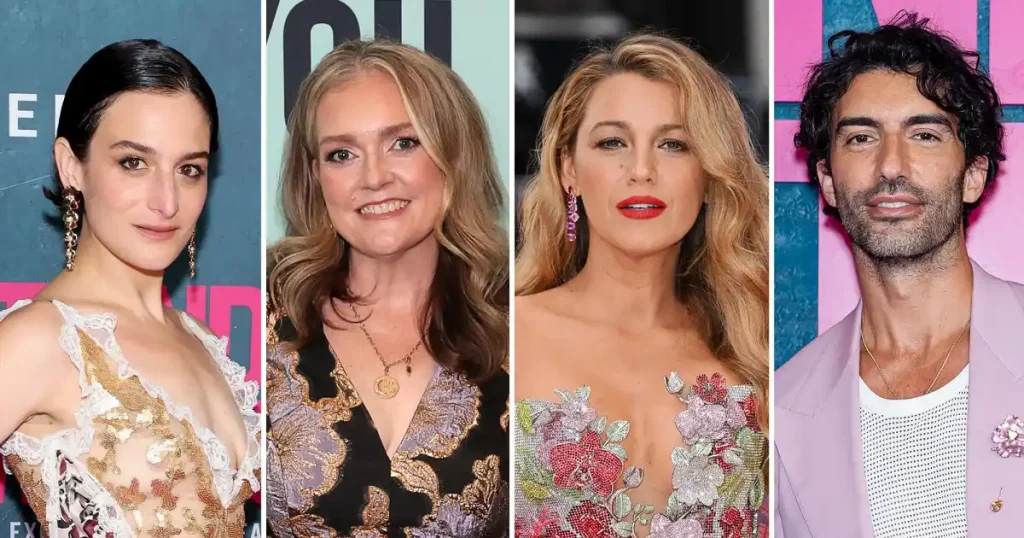“It Ends With Us” Stars and Author Drawn Into Blake Lively-Justin Baldoni Legal Dispute
In the latest development of the ongoing legal battle between Blake Lively and Justin Baldoni, key figures associated with the film “It Ends With Us” have been pulled into the dispute through formal depositions. According to recent reports from People magazine, author Colleen Hoover, whose novel inspired the film, has recently been deposed as part of the legal proceedings. Additionally, actress Jenny Slate, who portrayed the sister of Baldoni’s character, and Isabela Ferrer, who played the younger version of Lively’s character, reportedly gave depositions over the summer. These developments signal an expansion of the conflict beyond the two principal actors, drawing in other creative stakeholders connected to the production as the case continues to unfold in the public eye.
The legal confrontation between Lively and Baldoni began in December 2024 when Lively filed serious allegations against her co-star and director. She accused Baldoni of sexual harassment, creating a hostile work environment, and orchestrating what she described as a smear campaign against her reputation. Baldoni strongly denied these claims and responded with a countersuit against Lively. Though a judge later dismissed Baldoni’s lawsuit, Lively’s legal action remains active and is scheduled to go to trial in March 2026. This protracted timeline suggests that the industry and public will be following the developments in this high-profile case for well over a year before any legal resolution might be reached, highlighting the often lengthy nature of entertainment industry disputes when they enter the court system.
The widening legal situation has created ripples throughout the film’s cast, with several members publicly taking positions in the dispute. Slate made her allegiance clear through a public statement supporting Lively, describing her as “a leader, loyal friend and a trusted source of emotional support.” Similarly, author Hoover expressed solidarity with Lively on Instagram, praising her for being “nothing but honest, kind, supportive and patient” and thanking her “for being exactly the human that you are.” These public declarations of support demonstrate how the conflict has created divisions among those who worked on the film, forcing many to choose sides in what has become not just a legal matter but a public relations situation for everyone involved with the production.
In July, the legal process intensified when Lively was deposed in New York City by Baldoni’s legal team, with Baldoni himself reportedly present during the questioning. Following this deposition, Lively’s spokesperson expressed satisfaction with the proceedings and indicated that they were looking forward to deposing Baldoni and other defendants. The spokesperson also emphasized the confidential nature of deposition testimony, explaining that such evidence is subject to specific objections and rules, and that juries don’t simply receive transcripts but rather hear testimony presented under judicial supervision. This statement suggests that Lively’s team is confident in how her testimony will be received when the case eventually reaches trial, while also managing public expectations about what information might become available before then.
Isabela Ferrer’s involvement in the legal proceedings has become particularly contentious, with allegations that Baldoni’s team was “harassing” her through their legal tactics. Her attorneys made serious claims in court documents obtained by Us Weekly, alleging that Baldoni had attempted to “manipulate, threaten, control and otherwise act inappropriately” toward her. Baldoni’s legal representatives firmly denied these accusations, countering that they had been “ignored” after multiple attempts to request information from Ferrer’s lawyer. This escalation involving a younger cast member adds another complicated dimension to the case, raising questions about power dynamics and the potential impact of high-profile legal disputes on less established performers caught in the crossfire.
As the case continues toward its 2026 trial date, the expanding scope of depositions suggests that virtually everyone connected to the film may eventually be called to provide testimony. The involvement of Hoover is particularly significant, as the creator of the source material who might have unique insights into the creative direction and behind-the-scenes dynamics during production. The continuing legal process highlights the complex interpersonal and professional relationships that can exist on film sets, and how quickly they can deteriorate when allegations of misconduct arise. While fans of the book and film wait for legal resolution, the industry watches closely as this case potentially sets precedents for how disputes between performers and directors are handled, particularly when allegations of harassment are involved and when the accused also holds directorial power over the production.


